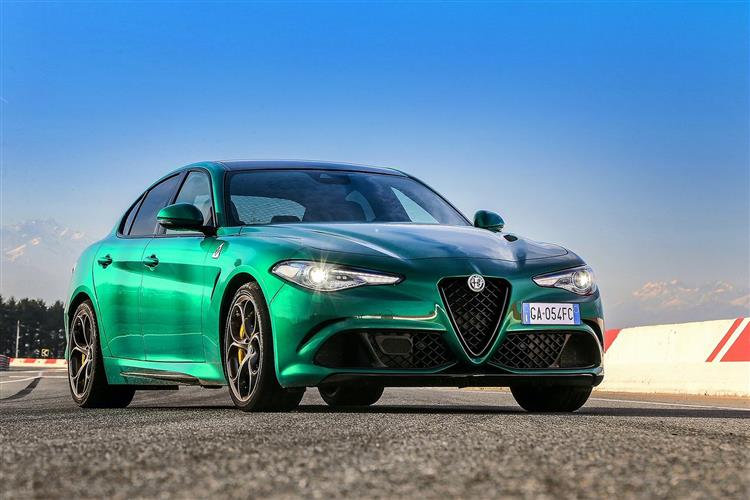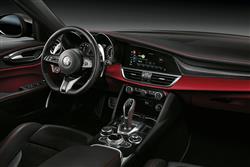VERY FAST LATIN LESSONS (some text hidden) --NONE--
By Jonathan Crouch
Introductionword count: 62
Take one of the most driver-orientated mid-sized premium sports saloons you can buy - Alfa Romeo's Giulia. Then give it a Ferrari-derived 510bhp 2.9-litre twin turbo V6. Add in a special torque differential to get all that power down through the rear wheels. And assign a Ferrari engineer to finesse this creation. The result was this Giulia Quadrifoglio: and it's rather unique.
Modelsword count: 5
4dr Saloon (2.9 V6 petrol)
Historyword count: 505
Prior to 2016, there had been regrettably little from the Alfa Romeo brand when it came to really powerful sports cars and super saloons - the kinds of models that might really appeal to keen drivers. At the launch of the Milanese marque's important Giulia saloon in 2016 though, we saw a car that represented just that, the Giulia Quadrifoglio. This model certainly had a proper engineering CV. Its V6 engine was inspired by a Ferrari V8 - and it was developed by an ex-Ferrari engineer too, Philippe Krief, the man behind the Maranello brand's much admired 456. The Quadrifoglio (or 'Cloverleaf') badge is one the Italian maker applies only to its most focused models. And its use was certainly justified here. There was a 'NRING Edition' in 2018 (limited to 108 cars and offering ceramic brakes, raw carbon fibre in the roof and body kit, Sparco carbon sports seats and extra carbon fibre in the cabin). In 2019, there was a further F1 special edition, with F1-style paintwork, carbon fibre aero parts and a titanium Akrapovic exhaust system. This model was 28kg lighter than the ordinary Quadrifoglio and had a slight power uplift to 520hp. Early 2020 brought an upgrade for the standard Giulia Quadrifoglio model, with technology, design, and safety upgrades. For the outside, changes were limited to LED rear lights, three new paint colours and a carbon fibre front grille. Inside there was a redesigned centre console, a switch away from carbon trim to leather and the addition of Level 2 autonomy features including traffic jam and highway assist. In Spring 2020, the rare Sauber-developed GTA versions of this model arrived - the 'ordinary' GTA version and a more track-focused GTAm. The engines in both cars were turbo-boosted and re-pistoned to 540hp and given a higher capacity cooling system. Track widths at both ends were increased by 50mm and centrelock wheels were added, along with a titanium Akrapovic twin-exit central exhaust system, along with carbon fibre for the skirts, driveshafts, bonnet, roof and wheelarches, a revised front bumper with smarter air intakes, and extra aluminium in the engine, doors, and suspension, which featured revisions to the springs, dampers and bushes. Both cars had rear diffusers, but the GTAm was distinguished by its extended chin splitter, Lexan side and rear windows, racing buckets and belts up front, back seats deleted in favour of a rollover bar, plus there was an enormous boot spoiler in place of the GTA's subtler boot lid lip item. A lot of weight was saved over the regular Quadrifoglio - in the GTAm it was quoted as 100kg. Both GTAs were said to offer the same 0.3sec reduction in the 0-62mph time, to 3.6sec. Sauber reckoned that the GTAm had double the GTA's downforce and triple that of the normal Quad. But then it did cost over £150,000... As for the standard Quadrifoglio, well a further update package was announced for the 2024 model year, but it's the earlier 2016-2023-period Giulia Quadrifoglio models we're going to look at here.
What You Getword count: 305
The taut proportions of the Giulia work well with the Quadrifoglio embellishment. Enthusiasts will most readily recognise this top Giulia version by its unique 19-inch wheels, through which you can glimpse black aluminium calipers - or optional yellow calipers. There's also a potent rear air diffuser and black gloss window surrounds. At the front, piercing bi-xenon headlamps give the car some serious overtaking presence. And at the rear, there are LED tail lamps, plus a sports exhaust with quad tail pipes. As usual, of more importance is the stuff you can't see, namely the use of ultra-lightweight materials in this variant's structure, including carbon fibre for the bonnet, roof, front splitter, rear spoiler and body inserts, as well as aluminium for the doors and wings. Inside, the cabin is set apart with sports seats upholstered in a leather-and-alcantara combination. You'd ideally want the carbonfibre-trimmed race-style bucket chairs that make you feel you're in a DTM racer. The dashboard and the door panels are also wrapped in stitched leather and there are carbon fibre inserts around the fascia, plus you get aluminium kick plates and an ambient lighting set-up for a classy feel after dark. Otherwise, it's the usual Giulia interior package, with design is centred around the driver, the main controls grouped together on the small steering wheel. When it's time to take a seat in the rear, taller folk might find access hindered a little by the swept-back roofline. Still, the rear door opens decently wide and once inside, you'll find that there's a decent amount of back seat space by class standards, with plenty of space to push forward your feet beneath the front seats. The boot opens to reveal a 480-litre capacity that, surely not co-incidentally, is the exact equal of a BMW 3 Series or a Mercedes C-Class from this era.
To see the full road test text contact us on 0330 0020 227
Pictures (high res disabled)

.jpg)
|
.jpg)
|
.jpg)
| |||

|
Scoring (subset of scores)
Category: Luxury Saloons and Estates
| Performance | |
| Handling | |
| Comfort | |
| Space | |
| Styling, Build, Value, Equipment, Depreciation, Handling, Insurance and Total scores are available with our full data feed. | |



